Mary Anne Yarde's Blog: The Coffee Pot Book Club , page 104
February 11, 2020
Join #HistoricalFiction author, Philip Yorke, as he takes a look at life in the time of Francis Hacker, there is also a chance to check out Philips fabulous book — Rebellion #EnglishCivilWar #Stuarts @yorkeauthor

Life in the time of… Francis HackerBy Philip Yorke
Three bloody Civil Wars devastated England in the mid seventeenth century. By the time peace had been restored, a King had been beheaded, the country had become a republic, Christmas Day had been abolished – and Oliver Cromwell had risen through the ranks to become the most controversial ruler in the nation’s history.Most of us know very little about this most violent and turbulent of times; a period when brothers became bitter enemies; when five percent of the population was brutally slain; and when religion shaped the political landscape in a way few of us can imagine.For the last eighteen months, I have been on an incredible journey uncovering all sorts of information about this fascinating time – the most gruesome in England’s history. My quest has been to write a debut novel, entitled Rebellion, capturing accurately the everyday problems confronting the people of the time.
 King Charles I.
King Charles I.The UK’s National Civil War Museum has greatly helped my work, as has the University of Leicester. Both have given me the opportunity to speak to eminent historians and touch and handle weapons, armour, clothing and everyday artifacts like news pamphlets, that defined the age. These experiences, and my own investigations, have given me a privileged insight into what it felt like to live in the 1640s and 1650s.As I have learned more about the times in which Francis Hacker, my main character, lived, I have counted my blessings. For I have no romantic desire whatsoever to have existed at a time of such unrest, when I would have been forced to back either the King or Parliament in their brutal conflict, and to inflict harsh and cruel deprivations on so many innocents. No, I am very content to live my life firmly in the twenty first century! For, despite our challenges with things like global terrorism and climate change, I know how lucky I am to be alive at this moment in time.So let me tell you a little bit about Francis, a noted Parliamentarian army commander, and a confidante of Cromwell.Francis was born in 1618, got married when he was just 14 years of age (to the 20-year-old Isabel Brunts) and went on to become a revered military leader in his own right.A man of few words, he rose to prominence in the New Model Army and eventually became its leading Colonel. His intelligence and ability to outwit his enemies were second to none, and there is no doubt he led from the front and was a true soldier’s soldier. He was immensely loyal to the cause, and the people, he served. And Francis was also a devoted husband and father.His courage was proven on many occasions, but most notably in April 1645, when the city of Leicester fell to the swashbuckling Royalist Prince Rupert after a short and brutal siege. After leading his men valiantly in a desperate rearguard action against superior enemy forces, Francis eventually surrendered. After his capture, he was offered the command of one of the King’s leading regiments of horse. He scornfully rejected the offer, knowing he would suffer deprivations and be reduced to beggary.
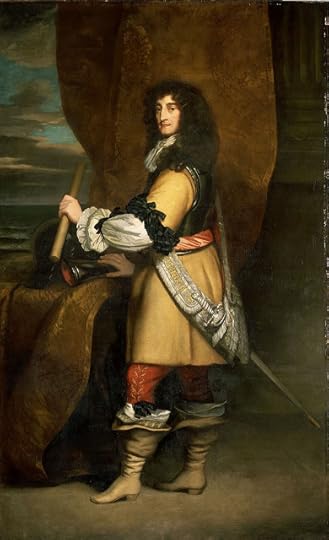 Prince Rupert.
Prince Rupert.By declining Rupert’s advances, Francis condemned himself to an extended second period of imprisonment at the Royalist stronghold of Belvoir Castle (he had also been a prisoner in late 1643). This confinement led to him being absent from the Naseby battlefield in July 1645, where Cromwell’s highly disciplined New Model Army comprehensively crushed the King’s forces, in a ruthless and precise manner not witnessed since the Roman invasion of Britain. Following this catastrophic defeat, the game was over for Charles. Within months, the first Civil War was at an end and the King was a prisoner.But the story of Francis Hacker is only just beginning...The King proved to be as cunning an adversary in defeat as he was while his armies still roamed the land, and before too long, hostilities between his supporters and Parliament recommenced for almost a year between 1648-49.Francis played a full role in taking the fight to the King’s men. As a result the revolt was extinguished. Yet this did not stop Royalists taking up arms once again in a bid to see the Prince of Wales, Charles’s eldest surviving son (also called Charles), restored to the throne.Just as had been the case previously, the third uprising was quashed in 1651, at the decisive Battle of Worcester. Francis commanded the Parliamentary army’s horse on the right flank and played a pivotal role in leading the New Model Army to victory.And that, you may think, should be the end of all that? Surprisingly, it’s not!For most of the decade, Francis is drawn into a number of extraordinary conflicts and intrigues.Plots against Cromwell emerge – perpetrated by a secretive band of Royalists known as “The Sealed Knot”. In total, eight attempts are made to topple the man who becomes England’s Lord Protector. As loyal and committed as he has always been, Francis played the fullest of roles in putting down the attempts to overthrow Cromwell, particularly in 1655, when he rounded up the ringleaders of one of the most notorious would-be coups.He was also highly active north of the border, where he helped Cromwell suppress the ambitious Scots.But, as the end of the decade approaches, time has started to run out for Parliament and Francis Hacker.
 Oliver Cromwell.
Oliver Cromwell.In 1658, Cromwell died suddenly. Broken-hearted by the shock death of his favourite daughter, the Lord Protector is struck down by a mystery illness many experts believe to have been malaria. He took his last breath on 3 September 1658. Cromwell’s demise plunged Parliament into a crisis from which it never recovered. The short-lived ‘reign’ of Richard Cromwell, Oliver’s oldest surviving son, ensued before he stepped aside as the head of the Protectorate and Commonwealth.With few options left, Parliament and the army decided to make overtures to the exiled Prince of Wales, who had been forced to live in France. Over several months, a deal was concluded that allowed the heir to the throne to return to England as sovereign, and for the monarchy to be restored.Which was all well and good – unless you happened to be Francis, or one of the other 58 signatories of Charles the First’s death warrant!And so unfolded the last chapter of a quite remarkable life, one that saw Francis betrayed by General Monck, head of the army; imprisoned and interrogated in the Tower of London; and then put on trial for High Treason, with a guilty verdict a foregone conclusion.Francis was officially condemned as a Traitor on 16 October 1660. He was hanged three days later at Tyburn. He was the last of the regicides to meet their doom – and the only one of the condemned men to be spared drawing and quartering. Infamy was his unjust reward for serving his country honestly and fulsomely.Rebellion, and the subsequent books in the series, tell Francis’s story for the first time, some 350 years after his death.If you read it, I hope you enjoy it.
RebellionBy Philip Yorke
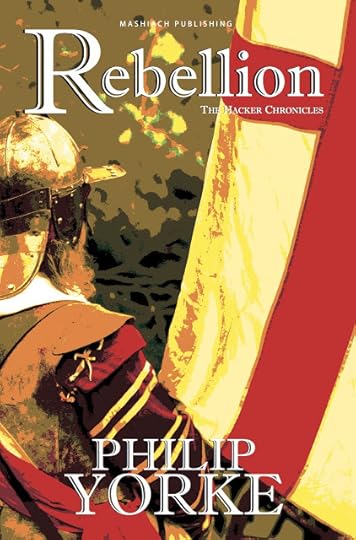 It is 1643.England is in the grip of a brutal, unforgiving civil war.Captain Francis Hacker returns to his home in the Vale of Belvoir after Parliament’s Northern Association army has been routed at the Battle of Adwalton Moor.The defeat is a bitter experience for Francis. He has lost many of his best men in the slaughter and there a few reasons to be optimistic, as the forces of Charles the First are now seemingly invincible.Out of the darkness and despair, Francis as asked by Parliament to lead a secret attempt to topple the King, thereby bringing months of death and destruction to an end.Little does he realise it will require him to become involved in a deadly deceit that puts everything he holds most dear at risk…
It is 1643.England is in the grip of a brutal, unforgiving civil war.Captain Francis Hacker returns to his home in the Vale of Belvoir after Parliament’s Northern Association army has been routed at the Battle of Adwalton Moor.The defeat is a bitter experience for Francis. He has lost many of his best men in the slaughter and there a few reasons to be optimistic, as the forces of Charles the First are now seemingly invincible.Out of the darkness and despair, Francis as asked by Parliament to lead a secret attempt to topple the King, thereby bringing months of death and destruction to an end.Little does he realise it will require him to become involved in a deadly deceit that puts everything he holds most dear at risk…Except
Life. Death. I am someone who holds the power to give one and take the other. And I revel in it.Since the troubles started, I have seen men, some little more than children, slain at my command. Occasionally, they have been brave and faced their fates boldly, unafraid, with their eyes wide open. But more often than I care to remember, they have pleaded for their lives before they have been put to the sword, or our muskets have barked fire. And, as the blade has cut forth, or the lead shot has bitten deep, their terror has been released and they have pissed and soiled themselves before succumbing to the after-life. For the end is nearly always brutal and demeaning. It is rarely kind. I have to tell you that I have not felt guilt, shame or remorse at these moments of lust. I have watched my enemies die and, to my eternal shame, rejoiced at their pain and suffering. I am at war. My men are at war. We are battle-hardened warriors fighting for a holy cause. And we will not let any puppet of the King stand in our way.But it hasn’t all been bloodshed and gore. I can recall many times when we have behaved with chivalry and compassion, when we have reunited our foe with their families and set them free, knowing they would soon be rallying under the Royalist banner, with husbands, fathers and sons returning to the fray in the hope of making a Parliamentarian kill. That knowledge hasn’t mattered. At these moments, we have been simple men once again. Not assassins.Right now, I am looking at more than a hundred unruly souls. They are my brothers in arms. It is late. There is a chill in the air. Most are drunk. Like me, all are filthy and stink. Yet I feel a unique bond with these men branded renegades and rebels by the King. Our loyalty is borne out of the God and cause we serve, the slaughter we have inflicted on our enemy, the pain we have endured as a group, and the pure joy we draw every day from the simple pleasure of being alive. It’s these things that are forging our identities, ensuring we become one of the most feared militias in the land.Out of the corner of my eye I can see Smith. Fat, bald and missing most of his teeth, he is a man of contrasting ugliness and beauty. On one level, he is a supreme killer, fearing nobody – least of all me. Skilled with sword, cleaver and musket, he is the one soldier you want by your side in the heat of battle. Yet he also has the most melodious voice I have ever heard. At this moment, he is singing a song – lamenting one of his many long lost loves and a lifetime of regrets – and it sounds like an angel is in our midst. My men, those sober enough to retain some sense and reason, have smiles etched on their faces. Huddled around the campfires, they are swaying to Smith’s wistful lullabies; they are hooked on every word; and they are as close to earthly heaven a tormented soul can be. They want to escape from their world of death, pain and futility, even if it’s just for a fleeting moment. And, I confess, so do I. Smith’s wondrous, tortured melodies, help us forget everything that has passed, and embolden us for what is about to come. We embrace moments of tranquility and joy with a vengeance and zest, and we heartily sing along. Until men like me give the order to break camp.“It’s almost time,” I say to Abijah Swan, my ever-loyal Subaltern. “Prepare the men. Tell them to be quiet. And let’s make sure the horses have been fed and watered, so they are ready for the long day ahead.”A nod of the head and an impish grin is all I get back in reply. And that’s all I need. Swan is my brother in everything other than flesh; the man I trust most in this murderous world. He’s got my back – and, in ten long months, he’s already saved my life many times. And my men love him. It’s little wonder. He’s one of them: tough, ruthless and seemingly without weakness. But he also possesses raw intelligence and is a natural leader. In truth, I tell you, there is not a better man alive with whom to share my fears, joys and pains.With the click of Swan’s tongue, the angelic singing stops abruptly. Smith looks up and his left eye twitches. In the silence, dozing men stir. Drunken heads are cleared.“Make ready,” says Abijah. “Check your muskets and your gunpowder; make sure they’re dry. Check your swords and daggers; they had better be sharp. And make sure you wear your helmets. They will save your life one day, but they will only do the job they are intended for if you lump heads happen to be wearing them!”As one, my men rise and go about their business with the precision of disciplined veterans. And I smile as I see many of them heeding Swan’s words, reaching for their ungainly and heavy helmets. Many seem too young to be consumed in this pitiless bloodshed. Rather than cleaning their daggers and counting their lead musket balls, they should be tucked up in their pallets and mattresses, with their loved-ones around them. Old-timers like Lambert, Hill and Hipwell, should have hung up their scabbards and muskets years ago. But they can’t. None of us can. They, like me, feel called to teach our King the lesson he deserves.
Pick up your copy ofRebellionAmazon UK • Amazon US • Barnes And Noble • Kobo• Apple Books
Philip Yorke
 Philip Yorke (known as "Tony") has a special interest in history – and loves reading intelligent, multi-layered plots and well-told stories.He is a former Fleet Street investigative news and sports journalist who worked for The Daily Mirror, The People, Daily Star and Sunday Business newspapers. He has also worked in the corporate, business and charitable worlds.Married to Julie, with whom he has five children, he enjoys relaxing to classical music; reading the works of Nigel Tranter, Bernard Cornwell, Robyn Young, Conn Iggulden, Robert Harris, Simon Scarrow and CJ Sansom; and supporting Hull City and Leicester Tigers. He is also an active church-goer.He lives in Leicestershire, England.
Philip Yorke (known as "Tony") has a special interest in history – and loves reading intelligent, multi-layered plots and well-told stories.He is a former Fleet Street investigative news and sports journalist who worked for The Daily Mirror, The People, Daily Star and Sunday Business newspapers. He has also worked in the corporate, business and charitable worlds.Married to Julie, with whom he has five children, he enjoys relaxing to classical music; reading the works of Nigel Tranter, Bernard Cornwell, Robyn Young, Conn Iggulden, Robert Harris, Simon Scarrow and CJ Sansom; and supporting Hull City and Leicester Tigers. He is also an active church-goer.He lives in Leicestershire, England.Connect with Philip: Website • Facebook • Twitter.
Published on February 11, 2020 20:00
February 10, 2020
Check out Richard Foreman's fabulous book — Siege #mustread #HistoricalFiction @RForemanAuthor

SiegeBy Richard Foreman

1098.The crusader army still stands outside Antioch. Starving. Deserting.An enemy force, led by Kerbogha of Mosul, is days away from relieving the walled city.Bohemond of Taranto calls upon the English knight, Edward Kemp, to meet with an agent, who is willing to provide the Norman prince with access to Antioch.But Bohemond is not alone in wishing to capture and lay claim to the prize. Edward must contend with enemies in his own camp.Should the knight's mission fail, then so may the entire campaign.Antioch must fall.
Recommended for fans of Bernard Cornwell, Michael Jecks and Conn Iggulden.
'The scenes of battle and clash of cultures are brilliantly depicted.' Jemahl Evans, author of Becket: Warrior
Siege is the first book in a new series, set during the First Crusade, by bestselling historical novelist Richard Foreman.
Pick up your copy ofSiegeAmazon UK • Amazon USRead for FREE with

Richard Foreman
Richard Foreman is a bestselling historical novelist. He is the author of multiple series set in Ancient Rome, including Sword of Rome, Sword of Empire, Spies of Rome and the Augustus saga. He has also written books set in the medieval period, Band of Brothers, and WW2 – Warsaw and A Hero of Our Time. His books have regularly broken through into the top 100 of Amazon and have been widely praised. His new book is Siege, the first in a series of novels set during the First Crusade.
For many years Richard worked as a publicist and literary consultant for numerous bestselling authors, including Simon Sebag-Montefiore, Kate Williams and William Dalrymple. During his time as a publicist Richard founded the London History Festival. He has also served as a judge for the HWA Crowns.
Richard is the CEO of Sharpe Books, one of the leading UK independent publishers. Sharpe Books specialises in publishing crime/thrillers, historical fiction and history books. Authors on their list include Michael Jecks, Sarah Gristwood, Saul David and Peter Tonkin. As well as publishing established writers, Sharpe Books accepts submissions from new authors too. Please see sharpebooks.com should you wish to get in touch and see their submission requirements.
Praise for Richard Foreman's Books
Spies of Rome
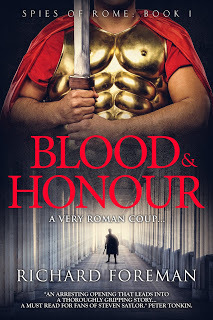 "A masterful and evocative depiction of a fledgling imperial Rome fraught with intrigue and at war with itself. The story and characters are as striking as the graffiti that adorns the violent city’s walls during Augustus' rise."Steven Veerapen, author of The Abbey Close."An arresting opening that leads into a thoroughly gripping story. Impressive research and understanding of the period allows Richard Foreman to move so seamlessly and effectively from historical epic to historical detective thriller. A must read for fans of Steven Saylor." Peter Tonkin, author of The Ides.
"A masterful and evocative depiction of a fledgling imperial Rome fraught with intrigue and at war with itself. The story and characters are as striking as the graffiti that adorns the violent city’s walls during Augustus' rise."Steven Veerapen, author of The Abbey Close."An arresting opening that leads into a thoroughly gripping story. Impressive research and understanding of the period allows Richard Foreman to move so seamlessly and effectively from historical epic to historical detective thriller. A must read for fans of Steven Saylor." Peter Tonkin, author of The Ides.
Amazon
Augustus: Son of Rome
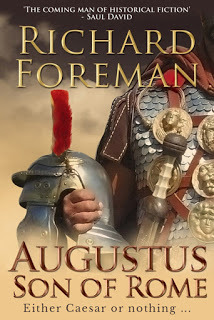
'Augustus: Son of Rome forges action and adventure with politics and philosophy. This superb story is drenched in both blood and wisdom - and puts Foreman on the map as the coming man of historical fiction’.Saul David, Author of the Zulu Hart series.
Amazon
Raffles:
The Complete Innings

‘Classy, humorous and surprisingly touching tales of cricket, friendship and crime.’David Blackburn, The Spectator.
Amazon
Band of Brothers:The Complete Campaigns
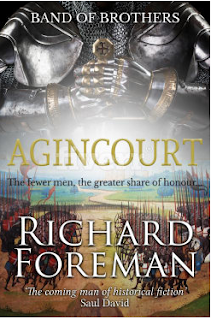 'Escapism at its best... A great read that tells much about the style of war and how the individuals fought.'Michael Jecks.'A rattling good yarn, requiring only the minimum of suspension of belief, and leaves one eagerly anticipating the next instalment of the adventures of the team as they accompany the King to Harfleur.' Major Gordon Corrigan, author of A Great and Glorious Adventure: A Military History of the Hundred Years War.
'Escapism at its best... A great read that tells much about the style of war and how the individuals fought.'Michael Jecks.'A rattling good yarn, requiring only the minimum of suspension of belief, and leaves one eagerly anticipating the next instalment of the adventures of the team as they accompany the King to Harfleur.' Major Gordon Corrigan, author of A Great and Glorious Adventure: A Military History of the Hundred Years War.Amazon
Warsaw

"Warsaw is a work of power. It has the authentic feeling that pulses from an important book. The meticulous research and psychological insights light up one of the most ghastly episodes in the history of man's inhumanity to man."Patrick Bishop, author of Fighter Boys and A Good War.
Amazon
Published on February 10, 2020 21:00
#HistoricalFiction author, Alistair Forrest, is sharing his inspiration behind his fabulous book — Libertas #AncientRome @alistairforrest
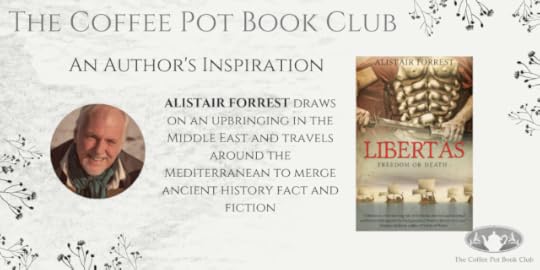
Finding Caesar in SpainBy Alistair Forrest
ALISTAIR FORREST draws on an upbringing in the Middle East and travels around the Mediterranean to merge ancient history fact and fiction
As a young journalist I used to laugh with colleagues who joked: “Never let the facts get in the way of a good story.” Alas, I have known some for whom this was a serious mantra, but for me – and my passion for history’s treasures – there’s something of a compromise to be embraced.
You can’t argue with facts, you can only weave your story around them. But first you have to dig them up like the gems they are, and that is a daunting prospect unless you are a 100-year-old historian whose life has been devoted to study.
I count myself lucky to have spent my childhood and early teens in three Middle Eastern countries and subsequently to have travelled widely as a journalist, always delving into the history that made each place what it is today. A burning passion to write historical fiction finally came to fruition with a six-year sojourn in Spain to “just write”. My wife and I chose a house amid well-tended olive groves in an upland valley opposite Monda, a charming village in the Sierra de las Nieves Natural Park not far inland from Marbella.
And it didn’t take long to discover that Julius Caesar had marched his crack legions through our garden.
 Our view of Monda.
Our view of Monda.Sure, sniffy historians will tell you that the Battle of Munda (45BC) against the sons of Pompey the Great didn’t take place at Monda, but at Osuna some 50 miles to the North West. Stuff and nonsense. I chose to believe the locals and started writing Libertas, revelling in the scenery and culture, and imagining what the community might have been like when Caesar came. More a case of, Let some of the facts make a good story.
There is a small section of Roman road leading towards Monda – enough of an historical site to halt the progress of a new road – and in the town there are ancient springs that never dry up and would have made this a logical ancient settlement. The town would also have been easily defended in a siege with ample water and a steep incline to where early palisades and Roman walls could have been. A Moorish castle now stands on a steep hill above the town, and although local folklore says there was a fort there in ancient times, this cannot be proved.
 The Roman road to Munda?
The Roman road to Munda?Though his work has been questioned by some historians, I trusted the account of Appian of Alexandria (c.95-c.165) who has a passage in which Caesar is goaded by Gnaeus Pompey. The young general accused Caesar of cowardice, prompting a degree of rage that ultimately led Caesar to personally thrust his way to the front line at Munda and exhort his troops to victory. Caesar was unusually brutal in his last battle. He believed he was right, his patience had run out and he had been called a coward.
Having researched the Battle of Munda, its causes and its effect on the politics of Rome, it was time to weave the story around the facts. Before the Romans came, the community was probably based on the simple things in life like hunting, animal husbandry, arable crops, baking bread and brewing. A lifestyle that remained unchanged in inland Andalucía until EC money built new roads for other Europeans to venture away from the Costas! That is the point – this happened in the 1st Century BC when the Celtiberian and Phoenician population came under the influence of the Romans, and towns like Munda became important satellite settlements in support of larger cities like Corduba (Cordoba) and Gades (Cadiz), often at the intersection of existing trade routes.
Rather than assume a collection of Pythonesque yokels whipping up rebellion and asking “What have the Romans done for us?”, I chose instead to develop the theme of an indigenous people who were creative and inventive in their own right. They understood herbcraft and lacked nothing for a full, healthy life. The hero in Libertas is not a warrior but a thinker. He is appalled at the horror that Rome brings to his hometown, but he warms to the younger of the Pompey brothers, Sextus.
Living in the same community as my protagonist, separated by centuries in which nothing much happened between Caesar and Franco, enabled me to add colour and feeling to my imagined community of bakers, brewers and cheesemakers. Happily I can refer to a comment by the Historical Novel Society’s reviewer: "Forrest makes us care about Munda. He captures the tragedy of a people dragged into the horror of a vicious war brought about by circumstances over which they had no control and could hardly understand."
In my research, I found myself liking the younger Pompey; his Roman sense of adventure would make the perfect foil for the more thoughtful hero, Melqart. And this is where I have taken a risk with the facts – the invention of embryonic Morse code, the retractable keel and an early torpedo (fired by ballista-type springs and pulleys).
And it is Sextus Pompey and ancient naval warfare that has inspired my next series of three novellas, the first of which is due for publication by Sharpe Books around now (February 2020). After defeat at Munda, the pirate leader escaped to Sicily and built a fleet to squeeze Roman supplies of grain and other goods, bringing famine and unrest to Italy under the new Triumvirate of Octavian, Mark Antony and Lepidus. Again, my travels in the region have served me well, not least sailing in a tall ship with the late author Leslie Thomas (The Virgin Soldiers), sensing the historic menace of Etna as we passed in its lee on an eerily still and misty morning. The volcano features in Libertasas well as the new series.
Where next? While a passion for writing remains, I will definitely return to my formative years in the Middle East and extensive studies of ancient Mesopotamia, including the amazing stories waiting to be reimagined of Assyrians, Israelites, Phoenicians and Philistines.

And while there’s ink my pen, I must surely make the most of the archaeological dig just a few yards from my home in Alderney where archaeologists Jason Monaghan and Phil de Jersey have uncovered well-preserved remains of Roman and Iron Age settlements. The historian Dan Snow is keenly interested in the site. But that’s yet another story…
 An Iron Age skeleton is discovered beneath a Roman floor at Longis, Alderney. Photo: David Nash.
An Iron Age skeleton is discovered beneath a Roman floor at Longis, Alderney. Photo: David Nash. With my faithful helpers at one of Alderney’s many forts.
With my faithful helpers at one of Alderney’s many forts.Libertas
By Alistair Forrest
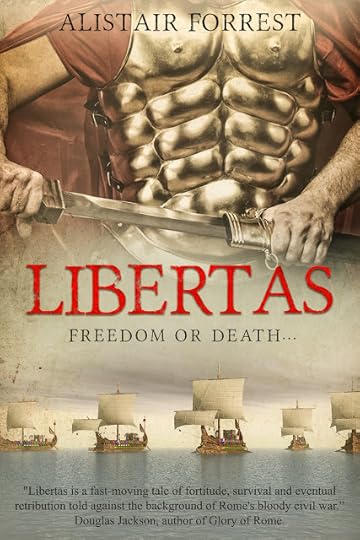
Spain 45BC. Julius Caesar’s crack legions bear down on an obscure Spanish town, Munda, at the climax of Rome’s civil war.
Against him are ranged the massed forces of Pompey the Great’s sons, Gnaeus and Sextus. To the victor, the spoils.
Caught up in the conflict is an unlikely hero, Melqart. Near fatally wounded in the battle, his family is sold into slavery and his people oppressed by Arsay One-Eye, a foe crueller than Caesar.
Melqart’s quest to free his family takes him to Sicily and the shores of Africa as he encounters enemies and allies alike.
Ultimately, the Spaniard must return to his homeland and confront Arsay. Melqart and his people must free themselves, or die trying.
Praise for Libertas
"Alistair Forrest's Libertas is a fast-moving tale of fortitude, survival and eventual retribution told against the background of Rome's bloody civil war.” Douglas Jackson, author of the best-selling Gaius Valerius Verrens series.
"Forrest has the gift of the true story-teller the ability to engage his readers interest from the very first sentence." Lord Cormack, politician, historian and author.
Pick up your copy ofLibertasAmazon UK • Amazon US
Alistair Forrest
 Alistair Forrest is a journalist, editor and author of historical fiction. He has worked for several UK newspapers, edited magazines in the travel, photographic and natural products sectors, and headed a PR company.
Alistair Forrest is a journalist, editor and author of historical fiction. He has worked for several UK newspapers, edited magazines in the travel, photographic and natural products sectors, and headed a PR company. He lives in the Channel Islands with his wife Lynda. They have five children, two Maremma dogs and a Spanish cat, Achilles.
His books are published by Sharpe Books of London. Alistair loves to hear from readers. Contact him through his website or Twitter.
Published on February 10, 2020 20:00
February 9, 2020
#BookReview — La Luministe by Paula Butterfield #HistoricalFiction #impressionists @pbutterwriter

La LuministeBy Paula Butterfield
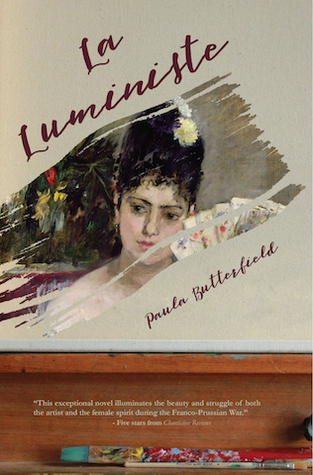
Above all, Berthe Morisot yearns to be a professional artist. Despite the skepticism of her parents and the male-dominated conservatism of the Parisian art world, Berthe pursues her artistic passion. Chafing under the tutelage of traditional masters, Berthe is mesmerized by Paris’ most revolutionary artist, the debonair Édouard Manet, whose radical paintings reflect a brash modern style. Berthe consents to model for Édouard and in the process falls deeply in love, an affair that both must keep hidden from the world, for Édouard is married to another.As the city of Paris is convulsed by the Franco-Prussian war, and dark family secrets are revealed, the lovers are driven apart. Berthe, after enduring the horrors of a city under siege, and suffering from recurring depression, marries Édouard’s brother, the mercurial Eugène Manet. Quiet married life is not for Berthe, however, and she—along with her infamous contemporaries, who include Edgar Degas, Paul Cézanne, and Claude Monet—develop the radical painting style that challenges the stifling traditionalism of the Salon: Impressionism. Collectively, they deem Berthe’s light-infused paintings the most avant-garde works of them all.La Luministe is the story of a woman driven by determination for professional recognition in a conservative art world equally determined to deny her a place. Despite her thwarted hopes for love and the physical rigors of war, Berthe Morisot emerges as one of art’s most remarkable women.

"I was baffled about my feelings for Manet. Was I falling in love with him, or did I wish I could be him?"
A poet cannot write poetry, they say, without first experiencing heartbreak. Likewise, an artist cannot call themselves an artist without the approval of the Académie. But there was one who was daring enough to break the rules of technique and subject matter. Édouard Manet's was a renegade, his work considered offensive, and yet the man himself was charming, charismatic, and utterly captivating.
Oh, how Berthe Morisot wanted to be a real artist. She did not want a husband and children as other women did. What Berthe and her sister dreamed of was becoming celebrated independent artists. However, although Manet gained fame by breaking the rules, when Berthe tried to do the same, she only got in trouble. Her darling Maman became even more determined to find Berthe a husband, but despite the many suitors, none of the men Berthe met convinced her that domestic bliss would be better than a life with just a pallet, a paintbrush, and endless possibilities.
But then on one day, one auspicious autumn morning, Berthe met Édouard Manet. Despite her determination to dislike him, Berthe found that she craved his touch. Berthe longed for his eyes to be focused on her face, and hers alone. And she was desperate for his conversation. Berthe understood Manet as no one else did, and he understood her. She was his canvas. He was her light. Berthe's greatest fear was that she was condemned to love him forever.
From the soaring, arched, glass skylights of the Louvre, to an invitation to join les Independents, La Luministe by Paula Butterfield is the unforgettable story of Berthe Morisot and a secret that she would take to her grave.
As Manet once said, "It is not enough to know your craft – you have to have feeling. Science is all very well, but for us, imagination is worth far more." Never a more accurate word was spoken, and although Manet was talking about his profession, I believe what he said applies to all of the arts, but it is true especially when it comes to writing historical fiction. A Bard can write a pretty story about the past, but a Master Bard can breathe life back into people who have been dead for many years. Butterfield is such a bard — she is such a writer. No one else could have written the story of Berthe Morisot the way Butterfield has. Butterfield's mesmerising narrative seduced me, and with a stroke of the brush, I found myself transported back in time to an era that was as foreign as it was revolutionary. This was a time of poetic lawlessness, where one man dared to try something different, and by being controversial, by doing his own thing, Manet paved the way for those, for the most part, penniless artists, whose paintings now sell for millions. This was the beginning of the Impressionists movement — with their bold brushstrokes, their dramatic use of colour and light. They immortalised a snapshot of life in one sacred moment. Butterfield has captured the excitement, the despair, the ridicule and the triumph in all its naked glory. In this book, we see the birth of Impressionism, and we watch as it is let loose upon the world in a storm of dazzling light and emotions — it yells from the rooftops that life is not symmetrical and nor is art. But above everything else, Butterfield has written a book that honours that enduring condition of human frailty that we know more commonly as love. Butterfield seemingly cries that love cannot be denied, and nor should it, for look what happens when it is. A tragedy. A curse. A missed opportunity for something better, something more — something that reminds us of the very reason for living. The emotion is raw. The prose is not.
This book is heartbreakingly beautiful because of the honesty of its heroine. Berthe is an intelligent woman who is incredibly driven, and this in a time when women had so many social and career limitations put upon them. Berthe knows that she and Manet can never be, but her heart cannot catch up with what her head is telling her. She loves him, and there is nothing she can do about that, even by marrying his brother, her love for Manet does not extinguish. This is a tragic love story that is as irresistible as it is enthralling. Once started there was no way I was going to put this book down, it captured my attention in the very first paragraph and, as I neared the end, I found myself desperately trying to read more slowly. I dragged out the final chapters because I did not want this story to end. I did not want to leave this place, these characters. Ever. But, as with all good things... I feel richer having read La Luministe, and despite the devastating ending, which I knew was coming, I would read it again and again.
There are no false idols in this book, Manet has his faults, but he is a loveable rogue, a very caring man underneath a veneer of indifference and indulgence. When in Berthe's company, we see the real Manet, the one hidden from the illustrious society that he keeps. Although this book is told for the most part from Berthe's point of view, Butterfield has presented her readers with letters from Manet to Degas, where Manet shares his innermost thoughts and desires. These letters were as moving as they were telling, and Butterfield allowed her readers to glimpse at the man behind the illness that would kill him, behind the paintings that he is so famous for.
One might think that when the hero of a book dies of something as awful as untreated syphilis, that there would be darkness to this story — an ugliness. There are dark moments, not only with regards to Manet's illness but also the Franco-Prussian War and The Siege of Paris, but there is nothing ugly about this book or these characters, not even when Manet is so ill, his passion, the way he sees, the way he thinks is so vivid in the telling. He is portrayed as the kind of man who could not, who would not ever die — there was too much life in him for that, too many paintings that he needed to paint. Still, as so often is the case, those who burn the brightest, burn the shortest. So, I warn you, have a box of tissues near to hand when you read this book, you are going to need it.
You don't have to be an expert on the Impressionist movement to enjoy this book. You don't even have to know who these artists are because Butterfield is an exceptional tour guide. But if you are, as I am, a lover of these artists and their work, then this book is a must-read.
What I loved about this book was that you could look up the paintings that are described as you read it, and by doing this, it made me feel an even stronger connection to the writing. With that in mind, as well as the tissues, I do recommend having Google to hand as well.
There is nothing about this book I did not love. It is an exceptional work of art. La Luministe, by Paula Butterfield, is utterly arresting from start to finish.
I Highly Recommend.
Review by Mary Anne Yarde.The Coffee Pot Book Club.
Pick up your copy ofLa LuministeAmazon UK • Amazon US
Paula Butterfield
 Paula Butterfield was born in New York and raised in Portland, Oregon. A writer since she could write, her first works were plays performed on a window seat with her little sister. As an art history student, Paula was struck by the fact that her textbooks contained few women artists. Was is possible that there were none worthy of mention?
Paula Butterfield was born in New York and raised in Portland, Oregon. A writer since she could write, her first works were plays performed on a window seat with her little sister. As an art history student, Paula was struck by the fact that her textbooks contained few women artists. Was is possible that there were none worthy of mention?After earning her MFA in Professional Writing from the School of Cinema at the University of Southern California, Paula worked as a story analyst for United Artists. Again, she came across few stories about women. But later, in the process of developing and teaching college courses about women in the arts, she discovered a wealth of stories and felt compelled to write about them. La Luministe, her debut novel, won the Chanticleer Book Reviews first place award for historical fiction.
Paula lives with her husband and daughter is Portland, Oregon and on the Oregon coast. Still committed to sharing women's stories, she is currently working on her next book about two rival American artists.
Connect with Paula: Website • Twitter • Goodreads.
Published on February 09, 2020 21:00
Check out Cory B. Scott's fabulous #NewRelease — God’s in the Garden #Memoir @corybscott1

God’s in the GardenBy Cory B. Scott

An exhilarating memoir about one man’s journey through physical, emotional, and spiritual abuse to find his inspiring personal awakening.
Shaken by the loss of his mother, drained by his pursuit of a doctoral degree, and conflicted over his experience with illegal and unethical activities in religious organizations, Dr. Scott found himself questioning everything he had been raised to believe. This questioning sends him spiralling down a dark rabbit hole into a new world he never knew existed.
Through original artwork, creative writing, and rigorously honest introspection. Dr. Scott take us all on a journey into the dark places that separate us from unfiltered truth.
Excerpt
My brewing feelings of bitterness and confusion about my faith and men and women of God seemed to be confirmed when I found it impossible to secure any help with the funeral service. I had already officiated at my father's funeral, and I did not want, nor did I think I was capable, of officiating at my mother's funeral.
We had no funds, and my mother did not leave a will so we needed to start a GoFundMe account to try and raise money so that my mother could be buried with my dad in the plot he bought. No one from the church contributed. I was hurting, bitter, and angry with God and his people.
I found myself free to be me, free to be angry, and free to question for the first time in a long time. I realized all the lies that I entertained. The people, the faith, the institution, it all seemed sincere until you question it or move to the sides. This was not the first time I realized this subtle truth, and I felt like a fool for falling into its snare again. This was the hundredth time if it was the first, I had opened myself up to an institution that only seemed to be aware of what their actions looked like rather than the real needs right in front of their eyes.
I swore I would not tolerate anything false in my life any longer. That meant taking a long hard look at my life, what I believed, and why I believed it. I was not looking for perfection, just something real, less perfect, and more genuine. It is ironic that the death of my mother was the beginning of a journey through the dark places that had grown between my creator and me. This was the dawning and the start of this journey and book.
I was given a rare opportunity to start anew. I could now call into question all that I had grown to believe. My eyes were open to the realization that my mother, the church, the institution of faith, and the followers of that faith had become my faith. The fact that I had relied so much on others was apparent when they were gone or unavailable. How had I strayed so far, why was my faith made of paper, what happened to it along the journey of life. Was it real? Is God real? Is there a God who cares for me without the intermediary of humans to show that love or tell me of him? Can I get back to the place that I vaguely remember when I was a small child? A place where I knew something loved me, something was bigger than me, something that I was once undisputedly connected to–whatever it was.
When I let go of the concept of God, I also lost my anger frustration and feelings of betrayal only a true God would relieve his creation of such burdens in such a selfless manner. C.B. Scott
Invitation to an Adventure
If you struggle with understanding your spirituality. If you're a victim of spiritual abuse and haven't figured out how to make it stop affecting your life, or if you enjoy learning from another’s mistakes, this is the book for you. A Buddhist once said to me that when a student is ready, the teacher would appear. It took me years to learn how to use the power of my mind to strengthen me rather than destroy me. If all your attempts at self-help have got you nowhere then maybe the trick is to be ready so the teacher can appear.
I have a theory that if you can empathize with someone else’s experience then you can learn from their mistakes. In essence, you can become ready and the teacher can appear. Feeling the emotion, pain, and internal conflict of another can bring you to the point where you are receptive. You may even be able to reclaim the personal power and independence you have given away.
In this book, I attempt to chronicle the evolution regression and transformation of a human soul. This book starts at the beginning and hopefully by the end it takes us back to the beginning anew. By way of self-examination, I attempt to find meaning in the complexity of what makes us spiritual beings. I attempt this chronicle in a vicarious way, bracketing myself long enough to discover my many perspectives. In photography, bracketing is the general technique of taking several shots of the same subject using different camera settings. In the same way, I attempt to be objective and honest as I evaluate my thought patterns, my failures, and my weaknesses from multiple perspectives; the role I played, the role others played, and the role a Higher Power played. Digging deeper into my understanding of God and how I have come to believe what I do. Further, I attempt to strip away all that is false and see what remains as it relates to my connection with my creator.
This life has been an adventure with many ups and many downs. I have the honor of being a survivor who has lost everything twice and wrestled with real and imagined deities for over 40 years. I hope this book will help my children understand their father and maybe themselves. I have always wanted them to be seekers of truth above all else. I want them to know it's OK to be human and to question authority of any kind, be it God, priest, or boss. I also want them to see the vacuum of self that is left when critical thinking is not employed. By extension, I also want this for anyone who invests in this book.
Pick up your copy ofGod’s in the GardenAmazon
Cory B. Scott
 Dr. Cory B. Scott has had an adventurous career that has afforded him the honor of such titles as, Doctor, Deputy, Lieutenant, Director, Executive, Reverend, and finally, his true passion, Professor. But those were just titles; He is really just, Daddy, Husband, Brother, Friend, Uncle, Mentor, writer, and finally, in 2019, he was awarded his true love, Grandpa. Cory has survived some devastating and tragic events along his path as well as some personal failures. These experiences have given him deep insight and a desire to help others overcome personal obstacles and transform their tragedies into strength and hope.
Dr. Cory B. Scott has had an adventurous career that has afforded him the honor of such titles as, Doctor, Deputy, Lieutenant, Director, Executive, Reverend, and finally, his true passion, Professor. But those were just titles; He is really just, Daddy, Husband, Brother, Friend, Uncle, Mentor, writer, and finally, in 2019, he was awarded his true love, Grandpa. Cory has survived some devastating and tragic events along his path as well as some personal failures. These experiences have given him deep insight and a desire to help others overcome personal obstacles and transform their tragedies into strength and hope.Cory weaves original artwork, poetry, and stories in an incredible memoir titled, "God's in the Garden." This book captures the essence of a survivor's journey through abuse, pain, loss, betrayal, and enlightenment. Cory is the author of the "Inspiring, Metaphoric, and Psychedelic Stories of Oopy Loopy Provenance." A series of stand-alone stories set in the murky provenances of the heart and the human condition. These adventures explore the depths of our humanity. These crafty works are designed to inspire and help the reader use the power of metaphor to identify and overcome common hang-ups that hold us back from enjoying this life and reaching our full potential.
Connect with Cory: Website • Twitter.
Published on February 09, 2020 20:00
Check out Deborah Swift's fabulous book — The Occupation #Jersey #WW2 @swiftstory @SapereBooks

The Occupation
By Deborah Swift

One woman’s secret war against the Nazis. One man’s war against himself…
1940, Jersey
When Nazi forces occupy Jersey in the English Channel Islands, Céline Huber, who is married to a German, must decide where her loyalty lies. Love for her island, and fear for her Jewish friend Rachel, soon propel her into a dangerous double life.
Meanwhile, Céline’s husband Fred is conscripted into the Wehrmacht in occupied France. Horrified by Nazi acts of atrocity and torture, he soon becomes a double agent for the French Resistance. But when things go wrong, and his Nazi masters discover his true allegiance, he finds he has the whole of the German Army on his tail.
How far will Céline go for her best friend? Will Fred make his way home to her, or will their lives be changed forever by the brutality of war?
Pick up your copy ofThe OccupationAmazon
Deborah Swift
 Deborah Swift is the author of three previous historical novels for adults, The Lady’s Slipper, The Gilded Lily, and A Divided Inheritance, all published by Macmillan/St Martin’s Press, as well as the Highway Trilogy for teens (and anyone young at heart!). Her first novel was shortlisted for the Impress prize for new novelists.
Deborah Swift is the author of three previous historical novels for adults, The Lady’s Slipper, The Gilded Lily, and A Divided Inheritance, all published by Macmillan/St Martin’s Press, as well as the Highway Trilogy for teens (and anyone young at heart!). Her first novel was shortlisted for the Impress prize for new novelists.She lives on the edge of the beautiful and literary English Lake District – a place made famous by the poets Wordsworth and Coleridge.
Connect with Deborah: Website • Facebook • Twitter • Goodreads.
Published on February 09, 2020 19:00
February 6, 2020
#HistoricalFiction author, J.P. Reedman takes a look at the lesser known daughter of Henry I. There is also the chance to check out J.P. Reedman's fabulous book — My Father, My Enemy #History @StoneLord1
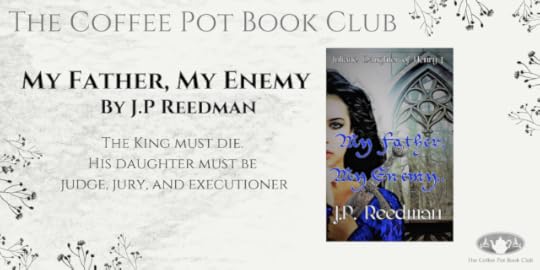
A Daughter’s RevengeBy J.P. Reedman
Of all English Kings, Henry I was undoubtedly the most fertile—although most of his children were born on the wrong side of the blanket. He had at least 22 illegitimate children, all of whom seem to have been well looked after, many of them becoming abbesses and churchmen, while others were married off noblemen and rich heiresses.
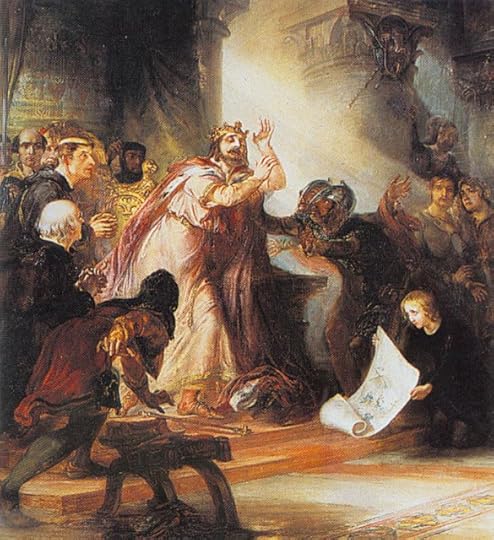
Possibly the eldest was Juliane or Juliana, born in England to a mistress called Ansfrida, who by her name appears to have been of Saxon ancestry. Juliane was probably the full sister of Richard of Lincoln, who drowned in the tragedy of the White Ship, along with his half-brother William, heir to England’s throne and his half-sister Matilda, Countess of Perche, another one of Henry’s many bastards.At around the age of sixteen, Juliane was sent to Normandy to marry a young lord, Eustace of Breteuil. They had a son and two daughters, and possibly another child who died young, but records are sketchy. We do not even know the daughters’ names—although they play a huge part in Juliane’s tragic tale.
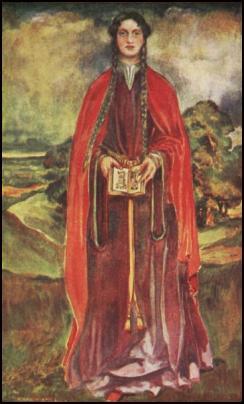
Like many Norman lords, Eustace was covetous of others’ lands and castles. Believing he had a claim on a neighbouring castle, he began hostilities with its long-term castellan, Ralph Harenc. King Henry I had to step in to try and work things out between the two men. He told Eustace he would consider his claim but it would take time; as a surety for his behaviour, Henry would take Eustace and Juliane’s two daughters, both under twelve, as hostages. Eustace would receive Ralph’s son in return.Why Eustace did what he did next is not recorded by history. He took Ralph’s young son and blinded him, then sent him back to his father. Ralph Harenc demanded Eustace and Juliane’s daughters be sent to him so he could take revenge. This put King Henry in a difficult position. If he said no, it would look as if he was untrustworthy and favoured his own family, no matter what. He handed the girls to Harenc, who not only blinded them but cut their noses as well.Needless to say, Juliane was enraged and grief-stricken at the fate of her daughters. With Eustace, she raised a rebellion against Henry (showing similar martial spirit to her half-sister, the infamous Empress Maude, mother of Henry II MY FATHER MY ENEMY LINK When she was alone at Breteuil, Henry arrived at her castle. After a brief standoff, she agreed to let him in—where she promptly picked up a crossbow and attempted to kill him with a bolt. She missed. The whole unhappy episode ended with Juliane leaping into the freezing moat and then fleeing to her husband at Pacy.She was never in her father’s favour again. Eventually she became a nun at Fontevrault Abbey.As for her girls, their fates are unknown, just like their names. Perhaps they died of their injuries; more likely they were sent away to a religious house. Perhaps that is why Juliane went to Fontevrault, to join the children she had attempted, in an act brave but foolhardy, to avenge.
My Father, My Enemy:
Juliane, Daughter of Henry I(Medieval Babes, Tales of Little-Known Ladies Book 6)By J.P Reedman

Juliane Fitzroy is the illegitimate daughter of Henry I--one of his twenty-two bastards.
When her father weds her to a young Norman lord, Eustace de Breteuil, she thinks she has done well in life for the daughter of a Saxon concubine.
But Eustace wants a castle he cannot have. He starts hostilities with its castellan, Ralph Harenc, egged on by the dubious Amaury de Montfort.To keep the peace, King Henry orders a hostage exchange between Eustace and Ralph. Juliane's pretty young daughters for Ralph's son.In a drunken rage, fuelled on by Amaury, Eustace breaks the truce and blinds Harenc's boy. Furious, the King allows Ralph to take his own brutal vengeance upon Henry's own granddaughters.
Crazed with grief, Juliane plots revenge for the maiming of her children.
The Wheel of Fate spins. The King must die, his own daughter judge, jury, executioner...
Pick up your copy ofMy Father, My EnemyAmazon UK • Amazon US
J.P. Reedman
 J.P. Reedman was born in Canada but has lived in the U.K. for 27 years.Interests include folklore & anthropology, prehistoric archaeology (Neolithic/Bronze age Europe; ritual, burial & material culture), as well as The Wars of the Roses and other medieval periods. Novels include I, Richard Plantagenet, The Man Who Would be King, Secret Marriages (Wars of the Roses), The Hood Game (Robin Hood), The Stonehenge Saga (Bronze Age), and Medieval Babes, an ongoing series about little-known Medieval women.
J.P. Reedman was born in Canada but has lived in the U.K. for 27 years.Interests include folklore & anthropology, prehistoric archaeology (Neolithic/Bronze age Europe; ritual, burial & material culture), as well as The Wars of the Roses and other medieval periods. Novels include I, Richard Plantagenet, The Man Who Would be King, Secret Marriages (Wars of the Roses), The Hood Game (Robin Hood), The Stonehenge Saga (Bronze Age), and Medieval Babes, an ongoing series about little-known Medieval women.J.P.’s most recent release is MY FATHER, MY ENEMY, about William the Conqueror’s granddaughter, Juliane Fitzroy, illegitimate daughter Henry I of England. Married to a Norman noble, life seems set for Juliane until her husband Eustace causes trouble with the castellan of Ivry. Hostages are exchanged by the King's order, Ralph's son for Juliane's daughters. A terrible tragedy happens and Juliane wants vengeance...she wants to kill the King.

Published on February 06, 2020 21:00
#BookReview — Adalbert by Craig R Hipkins #HistoricalFiction @CraigHipkins
Published on February 06, 2020 20:00
February 5, 2020
#BookReview — Songbird by Karen Heenan #HistoricalFiction #Tudors @karen_heenan
SongbirdA Novel of the Tudor CourtBy Karen Heenan

Bess has the voice of an angel, or so Henry VIII declares when he buys her from her father. As a member of the Music, the royal company of minstrels, Bess grows up within the decadent Tudor court, navigating the ever-changing tide of royals and courtiers. Friends come and go as cracked voices, politics, heartbreak, and death loom over even the lowliest of musicians. Tom, her first and dearest friend, is her only constant. But as Bess becomes too comfortable at court, she may find that constancy has its limits.

“Two days before my tenth birthday, my father sold me to the King of England.”
It was a great privilege, although as she watched her father walk away, Elizabeth “Bess” Davydd could not appreciate it. He had sold her. Her father had sold her to the King.
Growing up in a world dominated by music was a better alternative to the one Bess had been living, but still, it took some getting used to. If it had not been for Tom, Bess did not know what she would have done. From the moment thirteen-year-old Tom, a musician, had taken her hand in front of the court while her father so cruelly abandoned her, he had become Bess’ one constant.
As the two inseparable friends reached adulthood, Bess realised that everything about her life depended upon the whim of the King. There were rumours abound that the King no longer shared his Spanish Queen’s bed. What did this mean? No one knew. But, Bess had other things to concern herself with, for she had noticed how similar she was in looks to the King’s latest mistress’ sister, Anne Boleyn. And nobleman, Nick Hawkins, had caught Bess' eye.
From the squalid conditions of Southwick to the grandeur of the Field of Cloth of Gold and the intrigue and treachery of Henry VIII’s Tudor court during an unprecedented time in English History, Songbird by Karen Heenan is in all ways a Historical Fiction triumph.
I have read my fair share of books set in the Tudor period, but I have never read one from the perspective of the musicians that went wherever King Henry demanded them to go. And never has any book touched my heart as Songbird by Karen Heenan has. Songbird is one of those tremendously rare books that you may only ever stumble upon once in a lifetime. It is a totally bewitching story that enchanted me from the very first sentence, and even now, a day after I have read it, this book is all I can think about. It is an utterly enthralling story that is as beautiful as it is impressive. These characters, and their story, is hauntingly unforgettable.
The narrative is harmonically pleasing, the prose a sweet melody. Heenan has penned, or should I say composed, a story that is lyrically pleasing. It is an incredible success. Heenan has brought the court of Henry VIII gloriously back to life in all its splendour, and all its controversy.
Heenan demands every conceivable emotion from her readers. I laughed, I grimace, I felt embarrassment for young Bess, and at times...at times I found myself reaching for the Kleenex. Songbird is a bittersweet romance, a passionate affair. But above everything else, it is a story of unquenchable and undeniable love — and what a story it is.
Everything about Songbird is victorious, from the historical setting to the characters themselves. At the beginning of this story Bess is this musically-gifted sweet child who is overwhelmed by what she is seeing, where she is, and the fact that her father, of all people, has sold her to the King because she has a pretty voice. The moment Tom takes her hand, however, Bess feels this deep and almost ancient connection with him — as if two souls have found each other, although Bess is too young to understand such feelings. What she does know is that as long as Tom is with her, then she is safe. I absolutely adored Bess. She is a protagonist that you cannot help but love. We, lucky readers, watch this wonderful little girl grow up in the pages of this book. Heenan is candid in her depiction of Bess’ character, and everything that happens in Bess’ life is so incredibly believable. Heenan’s portrayal of Bess has such a sense of realism about it that it is tangible. It almost felt like a privilege reading about Bess’ life. Bess’ portrayal is brilliant. There is no other word for it. Absolutely brilliant.
Which leads me on to Tom. Dear, dear Tom, who is the most loving of children, the most caring of men. I believe Tom may have stolen a little piece of my heart while I was reading about him. He is the most wonderful hero that I have ever come across. Heenan has really outdone herself in Tom’s portrayal. There was nothing I did not love about him. Tom’s patience, his utter devotion makes him worthy. Tom is a character that feels very deeply. He loves completely, or not at all. I thought Tom’s depiction was fabulously executed. Bravo, Ms Heenan. Bravo, indeed.
There are, as you can imagine, many historical characters and events in this book. From Henry VIII, Queen Katherine, Princess Mary, Charles Brandon: The 1st Duke of Suffolk, Thomas Wolsey, and of course Anne Boleyn. Although these historical figures are, for the majority of this book, on the fringe of the story, they are however wonderfully depicted and rich in the telling. Heenan has managed to resurrect the dead back to life and make them breathe again. I mean, WOW! What an achievement. What a book!
Songbird is very luxurious in the historical detail. Heenan has certainly done her homework. She has captured the very essence of this era. Several historical events are depicted during this novel. In particular, I thought the portrayal of the Field of Cloth of Gold was particularly well-drawn. Heenan has captured the rivalry between Henry and Francis magnificently. Heenan seems to have an intuitive understanding of what makes history worth reading, and then she writes about it with such passion. It does not get any better than this.
There are many great Historical Fiction books based on the Tudor era, but Songbird by Karen Heenan is something not only extraordinary but also unique. I have never read a book like it. It is witty and inspired and so incredibly vivid. I loved every word, every sentence. It is a book that deserves to be read over and over again. Songbird is a vastly entertaining read and absolutely impossible to put down. It is tense, and it is powerful — a real treat.
I Highly Recommend.
Review by Mary Anne Yarde.The Coffee Pot Book Club
Pick up your copy ofSongbirdAmazon UK • Amazon US
Karen Heenan
 Karen Heenan was born and raised in Philadelphia. She fell in love with books and stories before she learned to read, and has wanted to write for nearly as long. After far too many years in a cubicle, she set herself free to follow her dreams – which include gardening, sewing, traveling and, of course, lots of writing. She lives in Lansdowne, PA, not far from Philadelphia, with four cats and a very patient husband.
Karen Heenan was born and raised in Philadelphia. She fell in love with books and stories before she learned to read, and has wanted to write for nearly as long. After far too many years in a cubicle, she set herself free to follow her dreams – which include gardening, sewing, traveling and, of course, lots of writing. She lives in Lansdowne, PA, not far from Philadelphia, with four cats and a very patient husband.Connect with Karen: Website • Twitter • Goodreads.
Published on February 05, 2020 21:30
Check out #HistoricalFiction author, Douglas A. Burton's, fabulous #NewRelease — Far Away Bird @douglasaburton
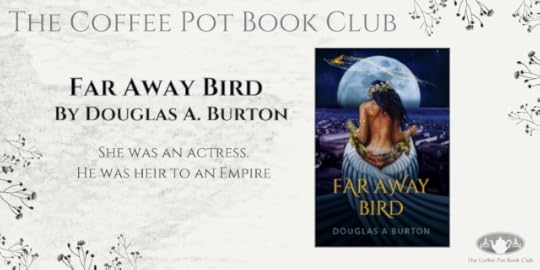
Far Away BirdBy Douglas A. Burton
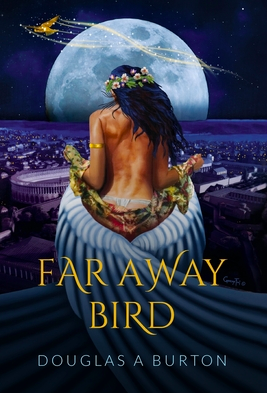
Inspired by true events, Far Away Bird delves into the complex mind of Byzantine Empress Theodora. This intimate account deftly follows her rise from actress-prostitute in Constantinople's red-light district to the throne of the Byzantine Empire.
Her salacious past has left historians blushing and uncomfortable. Tales of her shamelessness have survived for centuries, and yet her accomplishments as an empress are unparalleled. Theodora goes on to influence sweeping reforms that result in some of the first ever Western laws granting women freedom and protection. More than a millennium before the women's rights movement, Theodora, alone, took on the world's greatest superpower and succeeded. Far Away Bird goes where history classrooms fear to tread in hopes that Theodora can finally take her seat among the greatest women in history.
Theodora seems impossible--yet her transcendence teaches us that society can't tell us who we are deep down. Before there was a legendary empress, there was a conflicted young woman from the lower classes.
And her name was Theodora.
The Coffee Pot Book Club
★★★★★
Highly Recommended
Read the full review HERE!

The Historical Fiction Book Of
The Year Award 2019
The Early Medieval Period

Pick up your copy of Far Away BirdAmazon UK • Amazon US
Douglas A. Burton
 Douglas Alan Burton is a speaker, author, and expert storyteller whose work depicts heroic figures and their deeper connection to the human experience. Doug blogs about heroes, heroines, and villains in pop culture with some unexpected and refreshing perspective. He grew up in what he describes as “the heroic boyhood culture of late Generation X” that has gone mainstream around the world. He also shares strategies with fellow writers for writing compelling heroic characters in fiction.
Douglas Alan Burton is a speaker, author, and expert storyteller whose work depicts heroic figures and their deeper connection to the human experience. Doug blogs about heroes, heroines, and villains in pop culture with some unexpected and refreshing perspective. He grew up in what he describes as “the heroic boyhood culture of late Generation X” that has gone mainstream around the world. He also shares strategies with fellow writers for writing compelling heroic characters in fiction.Douglas recently began outlining a breakthrough storytelling model that reveals a fascinating “heroine-centric” model for story structure he calls The Heroine’s Labyrinth. He believes a powerful new archetype is emerging for women in fiction. His forthcoming novel, Far Away Bird, which centers on the early life of Byzantine Empress Theodora, won the 2019 Manuscript Content for Historical Fiction from the Writers’ League of Texas.
Connect with Douglas: Website • Blog • Twitter.
Published on February 05, 2020 21:00
The Coffee Pot Book Club
The Coffee Pot Book Club (formally Myths, Legends, Books, and Coffee Pots) was founded in 2015. Our goal was to create a platform that would help Historical Fiction, Historical Romance and Historical
The Coffee Pot Book Club (formally Myths, Legends, Books, and Coffee Pots) was founded in 2015. Our goal was to create a platform that would help Historical Fiction, Historical Romance and Historical Fantasy authors promote their books and find that sometimes elusive audience. The Coffee Pot Book Club soon became the place for readers to meet new authors (both traditionally published and independently) and discover their fabulous books.
...more
...more
- Mary Anne Yarde's profile
- 159 followers



